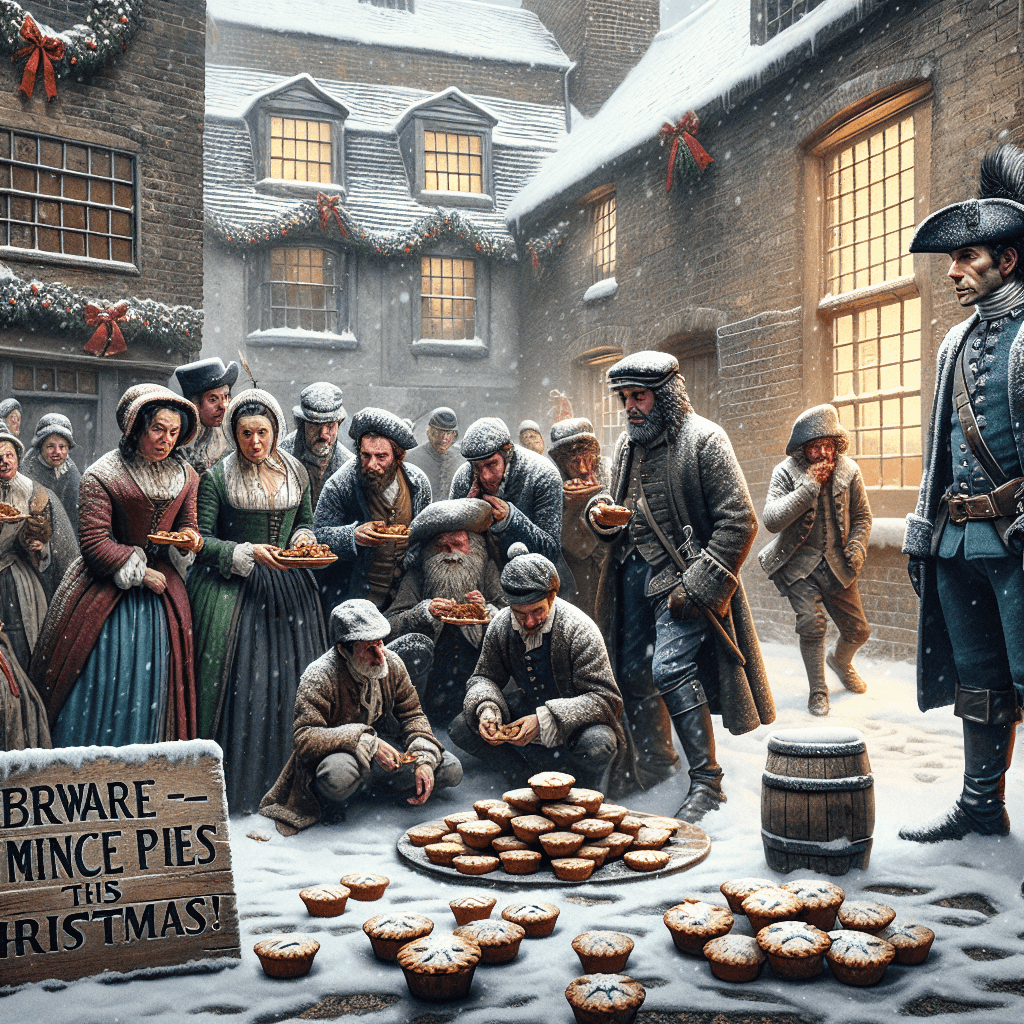Debunking a Festive Legend: Was it Really Once Illegal to Eat Mince Pies on Christmas Day in England
A curious rumour resurfaces every December: that eating mince pies on Christmas Day was once illegal in England. We delve into the historical records to uncover the truth behind this festive legend.


Too Long; Didn't Read
No, it was never specifically illegal to eat mince pies on Christmas Day. The myth is a misunderstanding of old Puritan laws that banned Christmas festivities in general, not specific foods.
Debunking a Festive Legend: Was it Really Once Illegal to Eat Mince Pies on Christmas Day in England?
Every December, as twinkling lights appear and carols fill the air, a curious rumour often resurfaces: that eating mince pies on Christmas Day was once illegal in England. It sounds delightfully absurd, doesn't it? A festive treat outlawed on the very day it's most associated with! But is there any truth to this persistent piece of historical gossip? This post delves into the historical records to uncover whether enjoying a crumbly, fruit-filled mince pie on December 25th could ever have landed you in trouble with the law.
The simple answer is, not exactly. While the rumour contains a kernel of truth rooted in a specific period of English history, the idea of a law explicitly banning the consumption of mince pies specifically on Christmas Day is a misunderstanding that has evolved over time. Let's unpack the history behind the myth.
The Puritan Crackdown on Christmas
The origins of this festive fable lie in the mid-17th century, during the period of the English Civil War and the subsequent Interregnum (1649-1660), when England was ruled by Parliament and Oliver Cromwell. The Puritans, a devout Protestant group influential during this era, viewed Christmas celebrations with deep suspicion. They believed:
- The festivities were rooted in pagan traditions and Roman Catholic practices ("popery").
- The associated feasting, drinking, merriment, and games were sinful and detracted from solemn religious observance.
- There was no biblical justification for celebrating Christ's birth on December 25th.
Driven by these beliefs, the Puritan-led Parliament took steps to suppress Christmas.
- 1644: An ordinance encouraged "the more solemn humiliation" instead of festivities on December 25th.
- 1647: Parliament passed an ordinance formally abolishing the feasts of Christmas, Easter, and Whitsun, confirming that December 25th should be treated as a regular workday or fast day, not a holiday.
- 1650s: Further measures reinforced the ban on Christmas celebrations. Shops and markets were ordered to stay open, and soldiers were sometimes sent to patrol the streets, seizing festive food being prepared.
Where Do Mince Pies Fit In?
Mince pies, then often larger and oblong (sometimes called "crib cakes," supposedly representing the manger) and containing actual minced meat alongside fruit and spices, were strongly associated with the traditional Christmas feasting that the Puritans abhorred. They were seen as a symbol of the very "superstitious" and indulgent celebrations being stamped out.
Therefore, while mince pies themselves weren't singled out by a specific law stating "Thou shalt not eat mince pies on Christmas Day," they were part of the broader Christmas celebrations that were effectively banned. Feasting was discouraged, holy days were abolished, and anything associated with the traditional, boisterous Christmas was frowned upon and actively suppressed. Eating mince pies as part of a Christmas Day celebration would certainly have gone against the spirit (and potentially the letter) of the laws of the time aimed at eliminating the observance of Christmas altogether.
The Myth Takes Shape
The specific focus on mince pies likely developed later, perhaps as a humorous exaggeration or misremembering of the historical clampdown on all Christmas festivities. The ban itself was relatively short-lived. With the Restoration of the monarchy in 1660, Charles II returned, and Christmas celebrations, along with mince pies, made a swift and popular comeback. The laws suppressing Christmas were repealed, and the nation largely returned to its festive traditions.
Historical records show Parliament sitting on Christmas Day during parts of the Interregnum, and accounts exist of people being reprimanded for attempting to hold Christmas services or feasts. However, there's no record of a specific law dedicated solely to prohibiting mince pie consumption on December 25th that remained on the statute books indefinitely.
Conclusion: Festive Fact vs. Fiction
So, was it really illegal to eat mince pies on Christmas Day in England? The truth is nuanced. There was never a specific, enduring law targeting mince pies alone. However, during the mid-17th century Interregnum, all Christmas celebrations, including the feasting that traditionally involved mince pies, were banned by the Puritan authorities. Eating them as part of a banned celebration would indeed have been illegal during that specific, relatively brief period. The popular rumour simplifies this complex history into a catchy, but ultimately inaccurate, soundbite. It’s a fascinating reminder of how historical events can be distilled into persistent myths, especially when they involve something as beloved as a Christmas treat!


